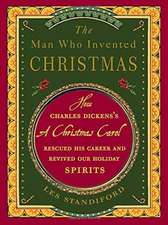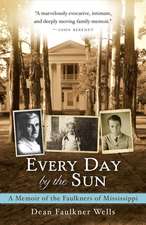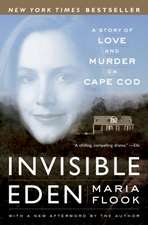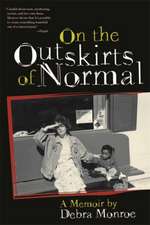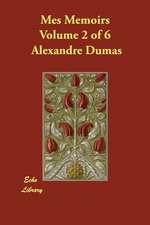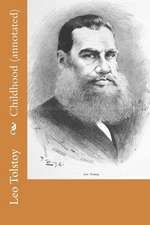My Sister Life
Autor Maria Flooken Limba Engleză Paperback – 31 dec 1998
Vezi toate premiile Carte premiată
Literary Award (1999)
With unrelenting realism and beguiling wit, Flook gives us an intimate account of her sister's life as a child prostitute, and of their coming of age in the 1960s--that surreal and wrenching moment of baby-boomer disenfranchisement, when the sexual revolution collided with the domestic fallout from the Vietnam War. From the ocean liners and Paris vacations of their refined upbringing to the gritty peepshows and adult theaters where they find jobs, the girls flee from a beautiful and tormented matriarch with secrets of her own.
Her missing sister becomes Flook's secret heroine--the sole example to follow in her journey into womanhood. The sisters live in trailer parks. They are faced with sexual assault, car thefts, and petty crimes with unpredictable men. Escaping from an abusive Vietnam vet, Karen takes her toddler to join her sister, who is herself raising a baby on her own; it is the first time they are under the same roof since their childhood. Their unorthodox reunion allows the sisters to forge a life-saving bond.
My Sister Life moves beyond biography or memoir to give us an astonishing vision of an American family--an authentic testimony to the defiant, undaunted faith between two sisters who connect after years apart.
From the Hardcover edition.
Preț: 118.19 lei
Nou
Puncte Express: 177
Preț estimativ în valută:
22.62€ • 23.47$ • 18.90£
22.62€ • 23.47$ • 18.90£
Carte disponibilă
Livrare economică 22 februarie-08 martie
Preluare comenzi: 021 569.72.76
Specificații
ISBN-13: 9780767903158
ISBN-10: 0767903153
Pagini: 368
Dimensiuni: 142 x 218 x 24 mm
Greutate: 0.49 kg
Editura: BROADWAY BOOKS
ISBN-10: 0767903153
Pagini: 368
Dimensiuni: 142 x 218 x 24 mm
Greutate: 0.49 kg
Editura: BROADWAY BOOKS
Notă biografică
Maria Flook is the author of two novels, Open Water and Family Night (which received a PEN American/Ernest Hemingway Foundation Special Citation), and a collection of short stories, You Have the Wrong Man. The recipient of a National Endowment for the Arts fellowship and a Pushcart Prize for fiction, she teaches in the graduate writing seminars at Bennington College.
From the Hardcover edition.
From the Hardcover edition.
Extras
Excerpt from Chapter 1
WILMINGTON, DEL.
My sister Karen disappeared when she was fourteen years old. The Wilmington Journal ran a photograph of Karen with the word runaway? beneath her face. The next day they ran the same picture. The caption asked, dead or alive?
I was twelve years old. Karen told me, "I'm going to the corner, want anything? You want your Teaberry gum? Do you want a Hearn's cake?"
I sat at the kitchen table, writing five sheets of detention homework. My sister was dressed up, wearing smoky nylons and low heels that shifted her posture forward. Her lipstick was frosted salmon-pink. Her matte powder erased her features.
"I don't have money for sweets," I told her, fishing.
Karen said, "I've only got a dollar. That's not enough for both of us."
"Forget it," I said.
"I'm going to the store," Karen said again. She pinched the doorknob for a long time, I thought, before turning it. I saw the kitchen clock above her head; its second hand had become bent. As it circled the numbers, the needle scratched a silver gouge in the clock's white face. Then my sister went out.
When Karen hadn't returned after forty-eight hours, the Penny Hill police recognized that it wasn't a typical pout session or simple teen whimsy. Federal investigators were directed to our street. My father, Ray, laid out some of Karen's report cards with the teachers' comments. The FBI agent picked up one yellow booklet and read the teacher's remarks, "Karen is an agreeable student but too retiring. She should be encouraged to participate in class discussions."
"This says your daughter is the shy type?"
"She's quiet," Ray said.
"These shy kids don't usually take off. But sometimes a wallflower turns into a wild seed," the agent said.
Ray didn't like what the agent was suggesting, and he asked me to leave the room. I wasn't reluctant to leave because I could hear everything the agent said by standing inside the dining room chimney. Inside the mortared shaft, their conversation was amplified. I heard my mother sniffling. She ripped a tissue from its hollow box, and another. Veronica was giving a performance. The agent asked about our two older stepsiblings, each of them married and living on their own. Had Karen ever confided in one of them and run off to one of their homes?
"It wouldn't be an option," Veronica said.
Veronica was painting an icy picture of our family's splintered relations; she was implying that when people jump ship, it's every man for himself.
The FBI agent asked, "Does Karen have a nickname she goes by?"
"'Peaches,'" Ray said.
"Oh, please," Veronica said. "Only Ray called her that."
"That's right, I call her 'Peaches,'" Ray told the agent.
The FBI man asked, "Was your daughter a virgin?"
Veronica asked Ray, "What's your guess?" Her voice had an edge.
"These days, I don't know," my father said, and the FBI agent chimed in with his similar beliefs. "These days," he echoed Ray. The agent was careful to indict the age and not the girl herself. He wanted a list of Karen's boyfriends.
"Karen didn't have any boyfriends," Veronica said flatly.
"None? Are we sure?" Ray said.
"If she had had any boyfriends, do you think she'd have been so gloomy all the time?"
"Love is strange," the FBI man said.
There was a tight silence.
"In fact, if your daughter acted gloomy, that's a good sign she was in over her head," the agent told my parents.
I was asked to return to the room to relate the details of Karen's departure. "What did Karen tell you?" the agent asked.
I told the agent what my sister had said, "'Do you want a Hearn's cake?'"
"What's that?" he said.
I described the tiny sponge cakes that were sold at a nearby grocery store. The cakes were the size of scented guest soaps and iced with a satin glaze, a buffed pearl patina in hues of shell pink and Wedgwood blue. These tea cakes triggered my greediest impulses. Each compact confection was not meant to be shared, but should be centered on the tongue in one languorous and prolonged absorption of its delicate extracts--vanilla and rose water. Hearn's cakes had an almost sinister power over the senses and sometimes seemed to--especially right then--affect my moral decisions and issues of conscience. Perhaps, if I had asked Karen to bring me one little cake, she might have returned home. She might never have disappeared.
The agent was impressed by my description of the sweets. He smiled at me. He asked, "What did Karen take with her when she left the house?"
I told the government official that Karen did not take a single thing. I looked down at my white sneakers, which were smeared with soot from the hearth.
"We have all the suitcases," Ray told the man.
The agent said, "She could have hidden a grip in the bushes."
"She didn't take anything," I said.
"We have all the suitcases," Ray said another time, as if he had lost sight of exactly what was missing.
The agent wanted to look around outside. We walked him full circle around our huge house, a fieldstone ranch. It was one hundred feet long, with blazing picture windows, massive squares of glass you could drive a tank through. These windows framed my youth; interior and exterior worlds merged or collided along these ten-foot transparent skins. Neighborhood families exhibited mirrored balls on pedestals, sport trophies, heirloom lamps, even a huge orchestral harp. Across the street our neighbors watched the FBI agent from their picture windows. I recognized Mr. Ossi peering at us, dressed only in his bathrobe and holding a baked apple in a dish.
"Where did you last see your sister?" the agent asked me.
"Right here on these kitchen steps."
I sat down on the fieldstone risers and squashed tiny red spiders with my thumb. The agent looked inside our sunken garbage cans, four sheet metal canisters recessed below the flagstone sidewalk. Karen and I had stood in these tin wells, daring one another to squat inside and close the lids. But their stench was too strong and the compartments too eerie, like drawers in a morgue. Once, maggots had infested an odd sliver of garbage until it twitched and curled like a living finger.
The agent stepped on the pedals until each heavy lid pried open. "She could have hid a suitcase in one of these cans," he said.
Ray was losing his patience. He insisted that he could account for every odd tote bag, duffel and valise. Ray told the agent that Karen had started a job after school at the Holiday Lanes. They might know something. The agent took down the address of the bowling alley. He looked grim, but he assured my father that some girls ran away with just the clothes on their backs.
Karen and I shared a room. Once, I had drawn an imaginary line down the middle of our bedroom, and if Karen put anything of her own on my side, I claimed it. When Karen was missing, all of her possessions were arranged in their proper places; there was no chance of them moving over the boundary and becoming my rightful property. I collected china horses and arranged them in formal rows across my dresser according to each one's temperament and conformation. These prancing mounts no longer allured me, and from my bed I studied the treasures on Karen's bureau glass. In the Nite Lite's dull arc, I saw her ceramic Siamese cat, slope-shouldered, with almond eyes and an emerald collar, a novelty shampoo bottle Karen had saved. I saw my sister's comb and brush, her blond hair coiled around the bristles. I saw her golden paperweight, a fossilized chunk of amber sap in which tiny bubbles of air were trapped.
The hours with my sister were too short. Our entire brief union could fit into the tiny oval of Karen's hand mirror: One school night, I ask Karen to brush my hair. I hold the hand mirror extended and watch my reflection as Karen pulls the bristles over the crest of my scalp, scouring my accentuated widow's peak. She angles the untame strands until my mane is plowed and parted. If I turn the mirror slightly, I can see Karen's face, a pink barrette between her teeth. She wrinkles her nose when our eyes meet. She fastens the clasp around a tight hunk of hair until the roots at my temples are stinging.
This hand mirror often comes back to haunt me. It is like a silver garden pond in memory, a bright oval of light splashed upon the ceiling of the psyche.
From the Hardcover edition.
WILMINGTON, DEL.
My sister Karen disappeared when she was fourteen years old. The Wilmington Journal ran a photograph of Karen with the word runaway? beneath her face. The next day they ran the same picture. The caption asked, dead or alive?
I was twelve years old. Karen told me, "I'm going to the corner, want anything? You want your Teaberry gum? Do you want a Hearn's cake?"
I sat at the kitchen table, writing five sheets of detention homework. My sister was dressed up, wearing smoky nylons and low heels that shifted her posture forward. Her lipstick was frosted salmon-pink. Her matte powder erased her features.
"I don't have money for sweets," I told her, fishing.
Karen said, "I've only got a dollar. That's not enough for both of us."
"Forget it," I said.
"I'm going to the store," Karen said again. She pinched the doorknob for a long time, I thought, before turning it. I saw the kitchen clock above her head; its second hand had become bent. As it circled the numbers, the needle scratched a silver gouge in the clock's white face. Then my sister went out.
When Karen hadn't returned after forty-eight hours, the Penny Hill police recognized that it wasn't a typical pout session or simple teen whimsy. Federal investigators were directed to our street. My father, Ray, laid out some of Karen's report cards with the teachers' comments. The FBI agent picked up one yellow booklet and read the teacher's remarks, "Karen is an agreeable student but too retiring. She should be encouraged to participate in class discussions."
"This says your daughter is the shy type?"
"She's quiet," Ray said.
"These shy kids don't usually take off. But sometimes a wallflower turns into a wild seed," the agent said.
Ray didn't like what the agent was suggesting, and he asked me to leave the room. I wasn't reluctant to leave because I could hear everything the agent said by standing inside the dining room chimney. Inside the mortared shaft, their conversation was amplified. I heard my mother sniffling. She ripped a tissue from its hollow box, and another. Veronica was giving a performance. The agent asked about our two older stepsiblings, each of them married and living on their own. Had Karen ever confided in one of them and run off to one of their homes?
"It wouldn't be an option," Veronica said.
Veronica was painting an icy picture of our family's splintered relations; she was implying that when people jump ship, it's every man for himself.
The FBI agent asked, "Does Karen have a nickname she goes by?"
"'Peaches,'" Ray said.
"Oh, please," Veronica said. "Only Ray called her that."
"That's right, I call her 'Peaches,'" Ray told the agent.
The FBI man asked, "Was your daughter a virgin?"
Veronica asked Ray, "What's your guess?" Her voice had an edge.
"These days, I don't know," my father said, and the FBI agent chimed in with his similar beliefs. "These days," he echoed Ray. The agent was careful to indict the age and not the girl herself. He wanted a list of Karen's boyfriends.
"Karen didn't have any boyfriends," Veronica said flatly.
"None? Are we sure?" Ray said.
"If she had had any boyfriends, do you think she'd have been so gloomy all the time?"
"Love is strange," the FBI man said.
There was a tight silence.
"In fact, if your daughter acted gloomy, that's a good sign she was in over her head," the agent told my parents.
I was asked to return to the room to relate the details of Karen's departure. "What did Karen tell you?" the agent asked.
I told the agent what my sister had said, "'Do you want a Hearn's cake?'"
"What's that?" he said.
I described the tiny sponge cakes that were sold at a nearby grocery store. The cakes were the size of scented guest soaps and iced with a satin glaze, a buffed pearl patina in hues of shell pink and Wedgwood blue. These tea cakes triggered my greediest impulses. Each compact confection was not meant to be shared, but should be centered on the tongue in one languorous and prolonged absorption of its delicate extracts--vanilla and rose water. Hearn's cakes had an almost sinister power over the senses and sometimes seemed to--especially right then--affect my moral decisions and issues of conscience. Perhaps, if I had asked Karen to bring me one little cake, she might have returned home. She might never have disappeared.
The agent was impressed by my description of the sweets. He smiled at me. He asked, "What did Karen take with her when she left the house?"
I told the government official that Karen did not take a single thing. I looked down at my white sneakers, which were smeared with soot from the hearth.
"We have all the suitcases," Ray told the man.
The agent said, "She could have hidden a grip in the bushes."
"She didn't take anything," I said.
"We have all the suitcases," Ray said another time, as if he had lost sight of exactly what was missing.
The agent wanted to look around outside. We walked him full circle around our huge house, a fieldstone ranch. It was one hundred feet long, with blazing picture windows, massive squares of glass you could drive a tank through. These windows framed my youth; interior and exterior worlds merged or collided along these ten-foot transparent skins. Neighborhood families exhibited mirrored balls on pedestals, sport trophies, heirloom lamps, even a huge orchestral harp. Across the street our neighbors watched the FBI agent from their picture windows. I recognized Mr. Ossi peering at us, dressed only in his bathrobe and holding a baked apple in a dish.
"Where did you last see your sister?" the agent asked me.
"Right here on these kitchen steps."
I sat down on the fieldstone risers and squashed tiny red spiders with my thumb. The agent looked inside our sunken garbage cans, four sheet metal canisters recessed below the flagstone sidewalk. Karen and I had stood in these tin wells, daring one another to squat inside and close the lids. But their stench was too strong and the compartments too eerie, like drawers in a morgue. Once, maggots had infested an odd sliver of garbage until it twitched and curled like a living finger.
The agent stepped on the pedals until each heavy lid pried open. "She could have hid a suitcase in one of these cans," he said.
Ray was losing his patience. He insisted that he could account for every odd tote bag, duffel and valise. Ray told the agent that Karen had started a job after school at the Holiday Lanes. They might know something. The agent took down the address of the bowling alley. He looked grim, but he assured my father that some girls ran away with just the clothes on their backs.
Karen and I shared a room. Once, I had drawn an imaginary line down the middle of our bedroom, and if Karen put anything of her own on my side, I claimed it. When Karen was missing, all of her possessions were arranged in their proper places; there was no chance of them moving over the boundary and becoming my rightful property. I collected china horses and arranged them in formal rows across my dresser according to each one's temperament and conformation. These prancing mounts no longer allured me, and from my bed I studied the treasures on Karen's bureau glass. In the Nite Lite's dull arc, I saw her ceramic Siamese cat, slope-shouldered, with almond eyes and an emerald collar, a novelty shampoo bottle Karen had saved. I saw my sister's comb and brush, her blond hair coiled around the bristles. I saw her golden paperweight, a fossilized chunk of amber sap in which tiny bubbles of air were trapped.
The hours with my sister were too short. Our entire brief union could fit into the tiny oval of Karen's hand mirror: One school night, I ask Karen to brush my hair. I hold the hand mirror extended and watch my reflection as Karen pulls the bristles over the crest of my scalp, scouring my accentuated widow's peak. She angles the untame strands until my mane is plowed and parted. If I turn the mirror slightly, I can see Karen's face, a pink barrette between her teeth. She wrinkles her nose when our eyes meet. She fastens the clasp around a tight hunk of hair until the roots at my temples are stinging.
This hand mirror often comes back to haunt me. It is like a silver garden pond in memory, a bright oval of light splashed upon the ceiling of the psyche.
From the Hardcover edition.
Recenzii
"My Sister Life is a box of dark treasures. It is a beautifully wrought story of the way things go wrong and the way people survive and exploit their detours of fate. Maria Flook writes with breathtaking artistry and precision. This memoir holds you in troubling and unpredictable ways. It is a mesmerizing work of nonfiction."
--James Ellroy, author of LA Confidential
"This disturbing book by one of the most powerful American writers at work today takes us through the ricocheting doppelgangering lives of two sisters and their eerie shipwreck shadows. I wished very much this book were fiction, but it is not."
--Annie Proulx
"A strange, beautiful and startling original work, which will alter and expand its genre: a memoir with all the virtues of the real and the imagined. In edgy inventive prose, Maria Flook writes in both her own voice and in that of her sister who disappeared into the world of prostitution at fourteen, showing the connections which entwine them through their separate experiences--the way in which her sister's life is her own. As in Family Night and Open Water, Flook reaches down into dark waters and emerges with an astonishing trove, glinting with treasure."
--Melanie Thernstrom
From the Hardcover edition.
--James Ellroy, author of LA Confidential
"This disturbing book by one of the most powerful American writers at work today takes us through the ricocheting doppelgangering lives of two sisters and their eerie shipwreck shadows. I wished very much this book were fiction, but it is not."
--Annie Proulx
"A strange, beautiful and startling original work, which will alter and expand its genre: a memoir with all the virtues of the real and the imagined. In edgy inventive prose, Maria Flook writes in both her own voice and in that of her sister who disappeared into the world of prostitution at fourteen, showing the connections which entwine them through their separate experiences--the way in which her sister's life is her own. As in Family Night and Open Water, Flook reaches down into dark waters and emerges with an astonishing trove, glinting with treasure."
--Melanie Thernstrom
From the Hardcover edition.
Descriere
This account of a life-saving bond between two estranged sisters offers a "fierce, uncompromising picture of (Flook's) family's painful disintegration . . . a jigsaw picture burned free of bitterness and sentimentality" ("The New York Times").
Premii
- Literary Award Nominee, 1999

